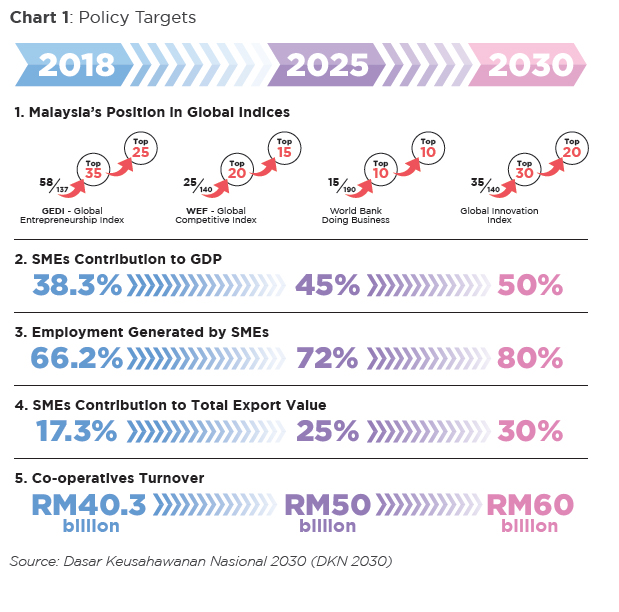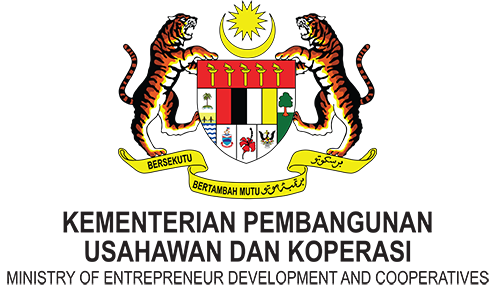DKN 2030 was launched by YAB Tun Dr. Mahathir Mohamad, Prime Minister of Malaysia on 11 July 2019. DKN 2030 is the first policy document by the newly established Ministry of Entrepreneur Development (MED) in line with the functions of the Ministry to formulate policies for the development of an inclusive and competitive entrepreneurial community, particularly the SME sector, that is capable of competing in the global market as well as to spur the development of the B40 group and social entrepreneurs.
“DKN 2030 is intended to be the nucleus and catalyst to drive a culture of entrepreneurship in the country, with the ultimate objective of creating a holistic and conducive entrepreneurial ecosystem to support an inclusive, balanced and sustainable sosio-economic agenda,” said the Prime Minister. DKN 2030 aims to increase the number of qualified, viable and resilient entrepreneurs as well as to enhance the capabilities of local entrepreneurs, particularly in the SME sector, in line with the Government’s shared prosperity concept. DKN 2030 is designed to develop an entrepreneurial ecosystem in Malaysia that will enhance the country’s competitiveness in the global economy amidst increasing competition and challenges emerging from Industry 4.0 as well as creating an entrepreneurial culture in the Malaysian society.
Malaysia’s Position in Global Indices The national macro targets under DKN 2030 are to increase SME contribution to GDP to 50.0% (currently 38.3%), generation of employment to 80.0% (currently 66.2%), contribution to total export value to 30.0% (currently 17.3%) and for the turnover of co-operatives to grow to RM60.0 billion (currently RM40.3 billion).
The policy sets out five objectives, which are:
DKN 2030 highlights six strategic thrusts with the objective of transforming the Malaysian economy into one that is sustainable, inclusive, progressive and driven by knowledge and innovation.Strategic Thrust 1
This strategic thrust aims at making creativity, innovation, risk-taking as well as the ability to act on opportunities arising as the basis to develop an entrepreneurial culture.
The two strategies adopted call for:
A1: Building of a critical mass of entrepreneurs
A2: Enhancement of entrepreneurship education and skills
Strategic Thrust 2
The six strategies adopted to create an environment with agile and facilitative governance and market-friendly regulations and financing are:
B1: Promote good governance
B2: Rationalise roles and functions of Entrepreneurship Development Organisations (EDOs)
B3: Enhance monitoring and assessment of outcome and impact
B4: Enhance and improve regulatory requirement for businesses
as existing trends of entrepreneurship activities in the country
B5: Reduce the bankruptcy stigma
B6: Improve access to finance and financial inclusion for entrepreneurs and enterprises
Strategic Thrust 3
Three strategies have been drawn up to increase entrepreneurial opportunities for all levels of Malaysian society in order to enhance the socio-economic status of all concerned, namely:
C1: Support entrepreneurial endeavor of Bumiputera, disadvantaged & special focus groups
C2: Co-operatives as driver to inclusive socio-economic development
C3: Promote social entrepreneurship
Strategic Thrust 4
The two strategies and their complementary initiatives to enhance collaboration between entrepreneurs, innovators and researchers in the formation, development and growth of enterprises are:
D1: Support the high growth and innovation-driven enterprise
D2: Facilitate technology exchange and innovation
Strategic Thrust 5
This strategic thrust aims at elevating MSMEs through value adding as well as the diversification of process, products and services. The four strategies adopted are:
E1: Strengthen the implementation of vendor development programme
E2: Enhance entrepreneurship skills and capabilities of MSMEs
E3: Provision of targeted support for market access especially for Bumiputera MSMEs
E4: Strengthen supply chain management
Strategic Thrust 6
This strategic thrust aims at creating strategic partnerships and alliances between local and international companies as well as compliance with global standards and quality. Towards this end, two strategies have been adopted, namely:
F1: Facilitate access for local enterprise especially Bumiputera to international market
F2: Promote networking and business collaboration
DKN 2030 targets for Malaysia to rise higher in the rankings of the global entrepreneurship, competitiveness, ease of doing business and innovation indices.
The target is to be in the top 25 ranks of the Global Entrepreneurship Index (currently 58 out of 137 countries), top 15 of the Global Competitive Index (currently 25 out of 140 countries), top 10 in the World Bank Doing Business report (currently 15 out of 190 countries) and top 20 of the Global Innovation Index (currently 35 out of 140 countries).
National Macro Targets






















